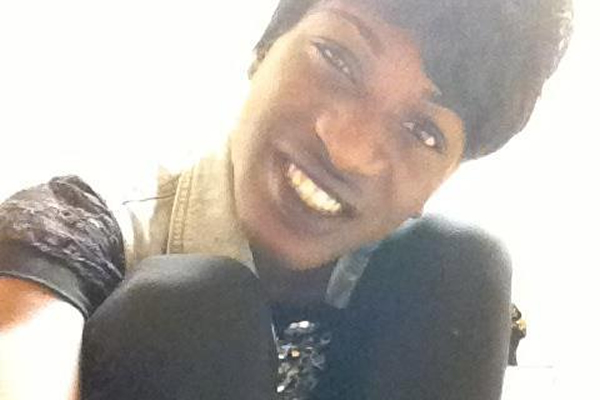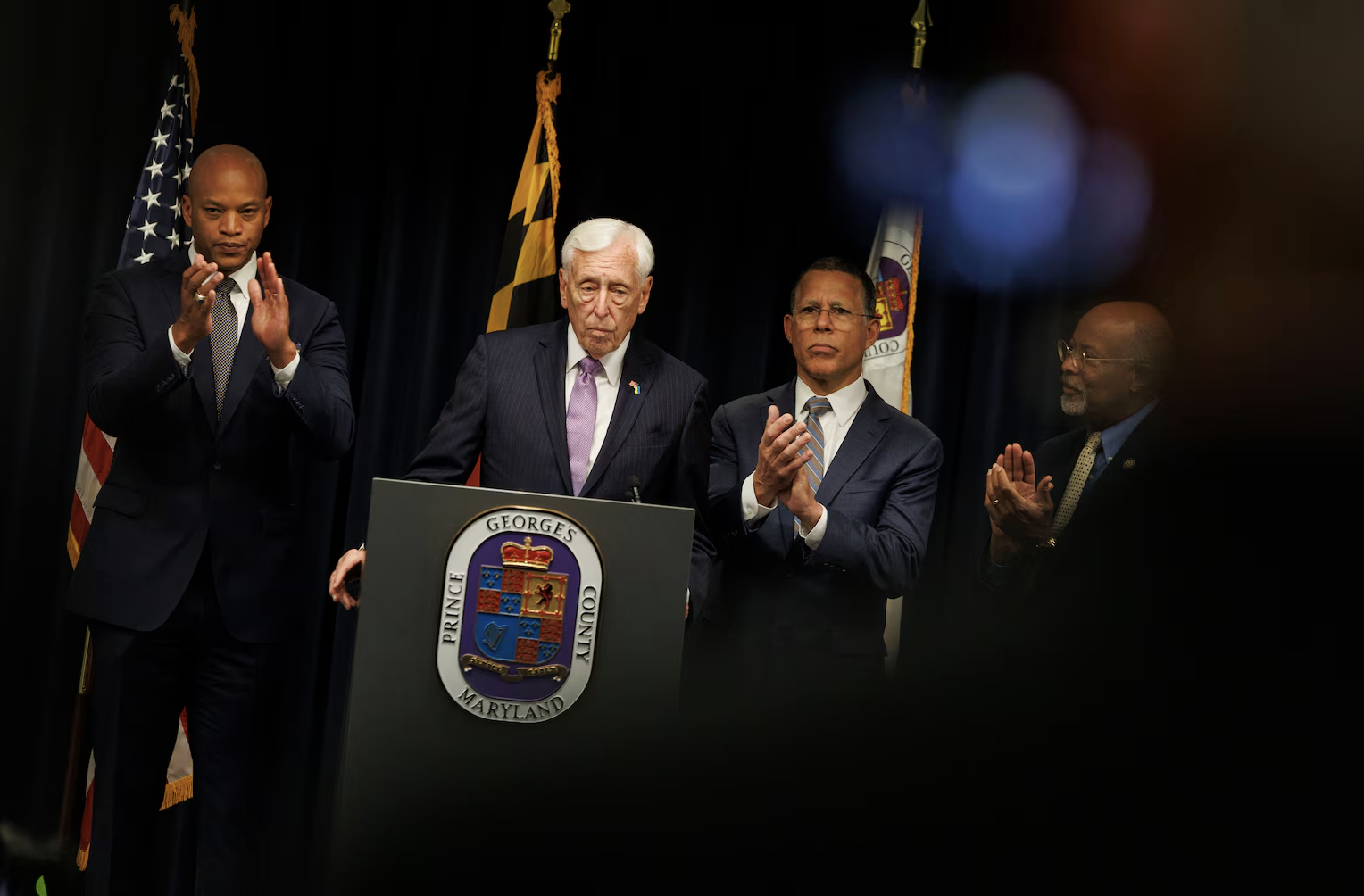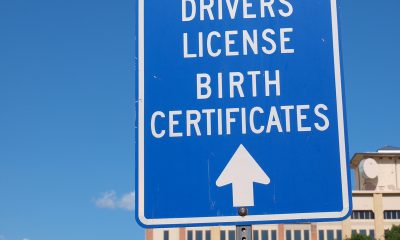Local
Men charged in D.C. trans murder case sentenced to eight years
Prosecutor says plea bargain was justified under ‘circumstances’

A D.C. Superior Court Judge on Friday sentenced two of four men originally charged with first degree murder while armed for the July 4, 2016, shooting death of transgender woman Deeniquia “Dee Dee” Dodds on a street in Northeast Washington to eight years in jail and five years of supervised probation upon their release.
The sentence by Judge Milton C. Lee came a little over two months after Jalonta Little, 31, and Monte T. Johnson, 26, agreed through their attorneys to a plea bargain offer by prosecutors allowing them to plead guilty to a single count of voluntary manslaughter in exchange for the murder charge and related gun violation charges to be dropped.
The plea agreement included a promise by prosecutors with the Office of the United States Attorney for D.C. to ask the judge for a sentence of eight years incarceration. Under D.C. law, a conviction on a charge of voluntary manslaughter carries a possible maximum sentence of 30 years.
As expected by court observers, Lee gave Little and Johnson full credit for the time they have already served in jail since their arrest. Johnson has been held without bond for four years and 10 months since his arrest in the Dodds case in February 2017. Little has been held for five years and two months since the time of his arrest in September 2016.
Lee also agreed to a request by prosecutors to issue a court stay away order prohibiting Johnson and Little from going to the areas where they targeted Dodds and other transgender women for armed robberies on the night of Dodds’ murder. Their targeting of trans women, some of whom were sex workers, prompted D.C. police to list the Dodds murder as a hate crime, a designation that was dropped by Lee during the 2019 trial on ground of insufficient evidence.
Lee sentenced Johnson to an additional 150 days in jail for an unrelated charge, to which he pled guilty, of Attempted Unlawful Possession of Contraband Into a Penal Institution. Court records show that Johnson and another inmate at the D.C. Jail were charged in September of this year with actual possession of the illegal contraband after the two stabbed each other with make-shift, knife-like objects while fighting.
Court records show Johnson was treated at a hospital for multiple, nonlife threatening stab wounds in connection with the incident. Prosecutors agreed to lower the charge to attempted possession of unlawful contraband in exchange for Johnson’s agreement to plead guilty. Judge Lee ordered that the additional sentence for Johnson of 150 days must be carried out consecutively to the eight-year sentence for voluntary manslaughter.
Both Lee and Assistant U.S. Attorney Sharon Donovan, the lead prosecutor in the case, pointed out that the Dec. 10 sentencing followed a March 2019 trial for Little and Johnson on the first-degree murder charges in the Dodds case that ended in a mistrial after the jury was unable to reach a verdict on the murder charges.
At the request of prosecutors, another trial for Little and Johnson on the murder was scheduled a short time later, but for reasons not disclosed in the public court records, the second trial was postponed several times and eventually cancelled after the plea bargain agreement was reached in September of this year.
The two other men charged in the Dodds murder, Shareem Hall, 28, and his brother, Cyheme Hall, 26, accepted a separate plea bargain offer by prosecutors shortly before the start of the 2019 trial for Johnson and Little in which they pleaded guilty to second-degree murder. They each testified as government witnesses at Johnson and Little’s trial, with Cyheme Hall testifying that it was Johnson who fatally shot Dodds in the neck at point blank range after she attempted to fight back when he and Johnson attempted to rob her.
Similar to Johnson and Little, the Hall brothers have been held without bond since the time of their arrests. They are scheduled to be sentenced on Dec. 20.
The U.S. Attorney’s Office has not publicly disclosed why they chose to offer the plea deal rather than bring Little and Johnson to trial again on the murder charge. Attorneys familiar with criminal cases have said prosecutors sometimes offer a plea deal after determining that going to trial a second time could result in a not-guilty verdict based on the circumstances of the case.
Judge Lee raised this issue in Friday’s sentencing hearing when he asked prosecutor Donovan to explain the recommendation of an eight-year prison sentence rather than a longer one.
“Obviously, an individual lost their life during the circumstances that gave rise to the charge here in the first trial that we had,” Lee told Donovan. “Can you tell me why, from the government’s perspective, do you think this particular sentence here agreed upon by the parties – eight years – do you think it’s an appropriate sentence under the circumstances that we’re aware of?” Lee asked.
“Your honor, we believe that this takes into consideration the first trial and the evidentiary difficulties that were highlighted during the first trial and other incidents that occurred during the first trial,” Donovan told Lee. “And that taking everything into consideration and considering the goal of sentencing obviously is to address the family and the community by trying to cross the sentence against the facts and circumstances in a particular case,” Donovan said. “And we believe that taking all of that into consideration that it is an appropriate sentence.”
Prior to handing down his sentence, Lee also mentioned that he received a community impact statement on the Dodds murder from the D.C. Center for the LGBT Community’s Anti-Violence Project. The attorneys representing Little and Johnson said their clients saw the community impact statement. Neither of them raised any objections to the statement. The statement was not read or released at the hearing.
The statement, which the Anti-Violence Project released to the Blade, called on Judge Lee to issue the maximum sentence for Little and Johnson.
“We adamantly request that the court impose the maximum sentences allowed, reinforcing respectful and impactful consequences to these defendants for their violent crimes,” the Anti-Violence Project’s statement says. “Additionally, we ask that you take into consideration the perceived vulnerability of the victim of the defendants’ violent crimes as a transgender woman of color whose rights and life were targeted in a way that confirms they did not matter to the defendants,” the statement says.
“This victim’s attempt to defend herself from their violence was answered with lethal brutality,” the statement continues. “Her voice is silenced, but the grief and outcry for justice from the LGBTQ+ community rises to honor her death and demand effective and responsive protection for the lives of all LGBTQ+ people targeted by future criminals.”
In a separate statement provided to the Blade last week, Anti-Violence Project Chair Stephania Mahdi expressed strong objections to the terms of the plea bargain offered by prosecutors.
“A plea bargain from first-degree murder to voluntary manslaughter as well as a reduction of years in sentencing from 30 to 8 communicates not only a miscarriage of justice, but a message of penalization for victims who attempt to protect themselves during a violent assault,” Mahdi said. “The continual impact of reducing the culpability of perpetrators who target members of specifically identified communities sends a malicious message to criminals that certain groups of people are easier targets with lenient consequences,” she said.
Prior to handing down his sentence, Lee asked prosecutor Donovan if a member of Dodds’ family would be providing him a statement or recommendation related to the sentencing. Donovan said one of Dodd’s aunts, who raised Dodds and who was unable to attend the sentencing hearing, relayed her views on the case to prosecutors.
“She wanted us to convey to the court that she believes that these men took someone special from the world and someone very dear to her,” Donovan said. “[She] said she cannot hold hate in her heart for these men because that is not who she is or how she chooses to live her life. She hopes these young men know right from wrong and realize these actions were wrong,” Donovan told the court.
“She says she knows that life is often difficult for young people,” Donovan continued. “But she hopes these men learn that actions have consequences. And she hopes they take this time to learn something important and do something better with their lives…”
Johnson and Little also spoke briefly just before Lee handed down his sentence. Little said he regretted having made “mistakes” during his life, which he said resulted in him spending most of his adult life in prison. Court records show Little has several prior criminal convictions.
“I did wrong because I was with the wrong people,” he said. “I will try to lead my life to the best of my ability.”
Johnson thanked Lee for accepting the terms of his plea. He said he wanted to send his “condolences’ to the Dodds family, adding, “I’m sorry for their loss.”
Virginia
Gay Va. State Sen. Ebbin resigns for role in Spanberger administration
Veteran lawmaker will step down in February

Alexandria Democrat Adam Ebbin, who has served as an openly gay member of the Virginia Legislature since 2004, announced on Jan. 7 that he is resigning from his seat in the State Senate to take a job in the administration of Gov.-Elect Abigail Spanberger.
Since 2012, Ebbin has been a member of the Virginia Senate for the 39th District representing parts of Alexandria, Arlington, and Fairfax counties. He served in the Virginia House of Delegates representing Alexandria from 2004 to 2012, becoming the state’s first out gay lawmaker.
His announcement says he submitted his resignation from his Senate position effective Feb. 18 to join the Spanberger administration as a senior adviser at the Virginia Cannabis Control Authority.
“I’m grateful to have the benefit of Senator Ebbin’s policy expertise continuing to serve the people of Virginia, and I look forward to working with him to prioritize public safety and public health,” Spanberger said in Ebbin’s announcement statement.
She was referring to the lead role Ebbin has played in the Virginia Legislature’s approval in 2020 of legislation decriminalizing marijuana and the subsequent approval in 2021of a bill legalizing recreational use and possession of marijuana for adults 21 years of age and older. But the Virginia Legislature has yet to pass legislation facilitating the retail sale of marijuana for recreational use and limits sales to purchases at licensed medical marijuana dispensaries.
“I share Governor-elect Spanberger’s goal that adults 21 and over who choose to use cannabis, and those who use it for medical treatment, have access to a well-tested, accurately labeled product, free from contamination,” Ebbin said in his statement. “2026 is the year we will move cannabis sales off the street corner and behind the age-verified counter,” he said.
Maryland
Steny Hoyer, the longest-serving House Democrat, to retire from Congress
Md. congressman served for years in party leadership

By ASSOCIATED PRESS and LISA MASCARO | Rep. Steny Hoyer of Maryland, the longest-serving Democrat in Congress and once a rival to become House speaker, will announce Thursday he is set to retire at the end of his term.
Hoyer, who served for years in party leadership and helped steer Democrats through some of their most significant legislative victories, is set to deliver a House floor speech about his decision, according to a person familiar with the situation and granted anonymity to discuss it.
“Tune in,” Hoyer said on social media. He confirmed his retirement plans in an interview with the Washington Post.
The rest of this article can be found on the Baltimore Banner’s website.
District of Columbia
Kennedy Center renaming triggers backlash
Artists who cancel shows threatened; calls for funding boycott grow

Efforts to rename the Kennedy Center to add President Trump’s name to the D.C. arts institution continue to spark backlash.
A new petition from Qommittee , a national network of drag artists and allies led by survivors of hate crimes, calls on Kennedy Center donors to suspend funding to the center until “artistic independence is restored, and to redirect support to banned or censored artists.”
“While Trump won’t back down, the donors who contribute nearly $100 million annually to the Kennedy Center can afford to take a stand,” the petition reads. “Money talks. When donors fund censorship, they don’t just harm one institution – they tell marginalized communities their stories don’t deserve to be told.”
The petition can be found here.
Meanwhile, a decision by several prominent musicians and jazz performers to cancel their shows at the recently renamed Trump-Kennedy Center in D.C. planned for Christmas Eve and New Year’s Eve has drawn the ire of the Center’s president, Richard Grenell.
Grenell, a gay supporter of President Donald Trump who served as U.S. ambassador to Germany during Trump’s first term as president, was named Kennedy Center president last year by its board of directors that had been appointed by Trump.
Last month the board voted to change the official name of the center from the John F. Kennedy Memorial Center For The Performing Arts to the Donald J. Trump And The John F. Kennedy Memorial Center For The Performing Arts. The revised name has been installed on the outside wall of the center’s building but is not official because any name change would require congressional action.
According to a report by the New York Times, Grenell informed jazz musician Chuck Redd, who cancelled a 2025 Christmas Eve concert that he has hosted at the Kennedy Center for nearly 20 years in response to the name change, that Grenell planned to arrange for the center to file a lawsuit against him for the cancellation.
“Your decision to withdraw at the last moment — explicitly in response to the Center’s recent renaming, which honors President Trump’s extraordinary efforts to save this national treasure — is classic intolerance and very costly to a non-profit arts institution,” the Times quoted Grenell as saying in a letter to Redd.
“This is your official notice that we will seek $1 million in damages from you for this political stunt,” the Times quoted Grenell’s letter as saying.
A spokesperson for the Trump-Kennedy Center did not immediately respond to an inquiry from the Washington Blade asking if the center still planned to file that lawsuit and whether it planned to file suits against some of the other musicians who recently cancelled their performances following the name change.
In a follow-up story published on Dec. 29, the New York Times reported that a prominent jazz ensemble and a New York dance company had canceled performances scheduled to take place on New Year’s Eve at the Kennedy Center.
The Times reported the jazz ensemble called The Cookers did not give a reason for the cancellation in a statement it released, but its drummer, Billy Hart, told the Times the center’s name change “evidently” played a role in the decision to cancel the performance.
Grenell released a statement on Dec. 29 calling these and other performers who cancelled their shows “far left political activists” who he said had been booked by the Kennedy Center’s previous leadership.
“Boycotting the arts to show you support the arts is a form of derangement syndrome,” the Times quoted him as saying in his statement.
-

 National5 days ago
National5 days agoWhat to watch for in 2026: midterms, Supreme Court, and more
-

 District of Columbia5 days ago
District of Columbia5 days agoImperial Court of Washington drag group has ‘dissolved’
-

 Colombia4 days ago
Colombia4 days agoGay Venezuelan man who fled to Colombia uncertain about homeland’s future
-

 Arts & Entertainment4 days ago
Arts & Entertainment4 days ago2026 Most Eligible LGBTQ Singles nominations


















